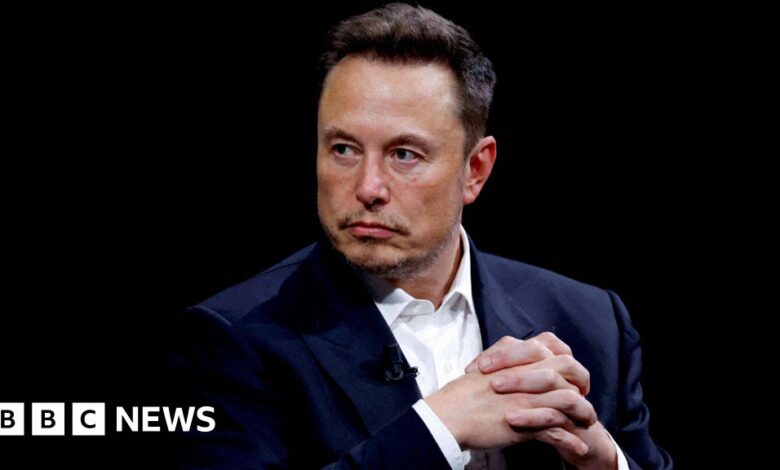Elon Musk’s X Says Brief Return to Brazil Was ‘Unintentional’

Some X users in Brazil were able to access the social media platform again on Wednesday despite the country’s judiciary issuing a ban last month.
Brazilian users flooded the website after X, a company owned by tech billionaire Elon Musk, updated how it accessed its servers in the country.
However, later on Wednesday, the company said the platform’s restoration in Brazil was unintentional.
On Thursday, a Brazilian court fined the company for “tricks” that allowed access to be restored for short periods of time.
Supreme Court Judge Alexandre de Moraes said the company had used “tricks” to restore access to some users in the country.
He fined X and Mr Musk’s other company, internet satellite firm Starlink, more than $920,000 (£695,000).
But it is unclear whether the court can enforce payment of the fine — Mr Musk’s companies have previously ignored Brazilian court orders.
Explaining why some users suddenly had access on Wednesday, X said a change in network provider had “resulted in a temporary and inadvertent restoration of service for Brazilian users.”
“While we expect the platform to become inaccessible again in Brazil soon, we continue to work diligently with the Brazilian government to restore operations for the Brazilian people as soon as possible,” an X spokesperson said in a statement.
The company’s explanation surprised some observers.
“Everything that happened during the day leads us to believe that this action was intentional,” said Basílio Rodriguez Pérez, an adviser to ABRINT, the country’s leading trade group for Internet Service Providers (ISPs).
ABRINT said X had moved to servers hosted by Cloudflare and the site appeared to be using a constantly changing dynamic internet protocol (IP) address, suggesting the change in Brazilian users’ access was intentional.
In contrast, the previous system relied on specific IP addresses that could be more easily blocked.
Those dynamic IP addresses could also be linked to critical services in Brazil, said Basílio Rodriguez Pérez, an adviser to ABRINT.
“Many of these IPs [addresses] shared with other legitimate services, such as banks and major internet platforms, making IP blocking impossible [address] without affecting other services.”
Including the PIX service, used by millions of Brazilians to make digital payments.
Despite the change, some experts say Cloudflare is still well-positioned to help Brazil enforce the ban.
“I actually think the ban would be even more effective if Cloudflare actually cooperated with the government,” said Felipe Autran, a constitutional lawyer in Brasilia, the country’s capital.
“I think they will do so because they are a big supplier to many Brazilian businesses as well as the government.”
Cloudflare declined to comment when contacted by the BBC.
Brazil is said to be one of the biggest markets for Mr Musk’s social network.
The platform was banned in the country last month after it failed to meet a court-imposed deadline to appoint a new legal representative in the country.
The event marks the most significant development in the fight between Supreme Court Justice Alexandre de Moraes and Mr. Musk, which began in April, when the judge ordered the suspension of dozens of X accounts for allegedly spreading misinformation.
At one point, Musk’s satellite internet provider Starlink — a subsidiary of spacecraft maker SpaceX — announced it would allow customers in Brazil to log on to X. Starlink backed off after the country’s telecommunications regulator threatened to revoke the company’s license to operate there.
Observers in Brazil have expressed frustration with both X and the Brazilian government over the rift.
“This is a game of chess and we are the pieces on the board,” Mr. Pérez said. “But it is not us who are playing. It is the government and X who are playing.”


